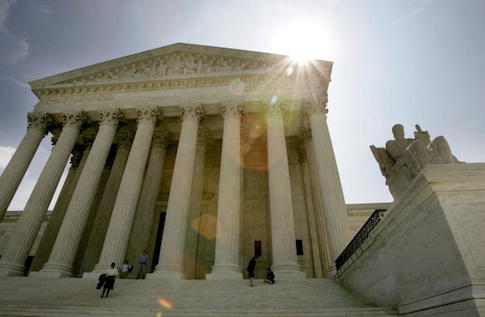The Supreme Court on Friday refused to take up Texas's bid to undo election certification in four battleground states, ending a longshot bid to secure a second term for President Donald Trump.
In an unsigned order, the High Court said Texas has no legal interest in policing election procedures in other states. A full vote count was not given, as is typical of such orders. The decision clears the way for the Electoral College to make Joe Biden's election official on Monday.
Friday's order snuffs out a legal challenge Trump touted as a game-changer in his legal campaign to swing the election to state legislatures. The president called Texas's complaint "the case that everyone has been waiting for" on Wednesday, and he hyped supportive legal briefs from himself, red states, and Republican lawmakers throughout the week. Election results will be further insulated from legal challenge after members of the Electoral College cast their ballots.
The decision will heighten pressure on Republican leaders, who have so far been equivocal about the outcome of the election, to acknowledge Biden's victory. It also means that the president will likely leave office without securing any legal recognition of his claims about election fraud. Attorney General William Barr said on Dec. 1 that he has not seen evidence of fraud on a scale that would tilt the results of the campaign.
Justice Samuel Alito and Clarence Thomas parted ways on a technical point, saying they do not believe the Court can dismiss suits like Texas's out of hand. But Alito also said he "would not grant other relief, and I express no view on any other issue."
The Texas suit targeted Georgia, Michigan, Pennsylvania, and Wisconsin. It claimed that late-breaking changes to the election procedures in those states were unconstitutional and created the opportunity for widespread fraud.
"As a result of expanded absentee and mail-in voting in defendant states, combined with defendant states' unconstitutional modification of statutory protections designed to ensure ballot integrity, defendant states created a massive opportunity for fraud," Texas's complaint reads.
Pennsylvania attorney general Josh Shapiro (D.) did not mince words in response.
"Texas's effort to get this Court to pick the next president has no basis in law or fact," Pennsylvania's brief to the justices reads. "The Court should not abide this seditious abuse of the judicial process, and should send a clear and unmistakable signal that such abuse must never be replicated."
The defendant states, legal observers, and even Texas Republicans found the lawsuit peculiar. Briefs from the four states Texas is suing attacked the suit from multiple directions.
One problem is standing, the legal right to sue. Election procedures in different states don't affect Texas's interests at all, the defendants said. They also faulted Paxton for waiting until Dec. 7 to file his lawsuit. That's over one month after the election, and just one week before the Electoral College votes.
Another problem is what the lawsuit asked the Court to do. Texas said the justices should disqualify any electors the defendant states had appointed and order a special election. Alternatively, Paxton urged the Court to toss out electoral votes "ineligible electors" might cast. The Supreme Court has never taken such action, and arguably has no power to do so.
"The novel and far-reaching claims that Texas asserts, and the breathtaking remedies it seeks, are impossible to ground in legal principles," Georgia attorney general Christopher Carr (R.) said in court papers.
The defendants also noted that their own courts have reviewed and rejected alleged election irregularities the Trump campaign flagged.
Ohio attorney general Dave Yost (R.) needled Texas for an apparent flip-flop. Ohio's brief said red states like Texas were right to sue when state courts or election officials changed election procedures late in the game. At the time, red states said the Constitution gives legislatures, not state courts or agencies, the power to set rules for choosing electors. But if it was wrong then to transfer electoral power from a state legislature to a state court, then it is certainly wrong now to transfer that power to a federal court.
"The Electors Clause means today what it meant a month ago," Ohio's filing reads.
